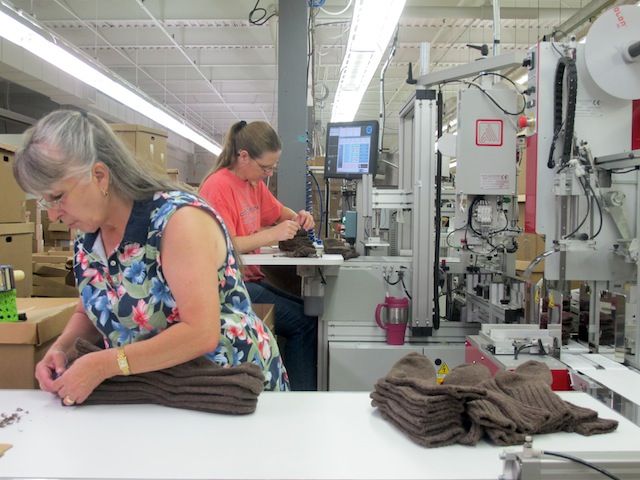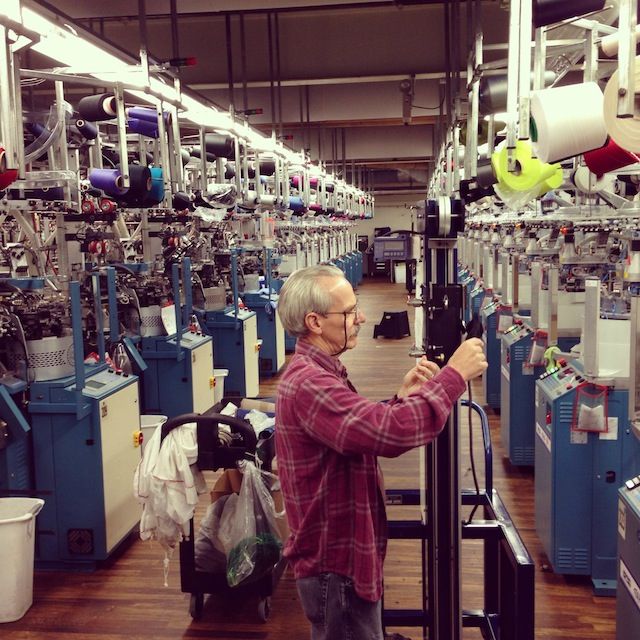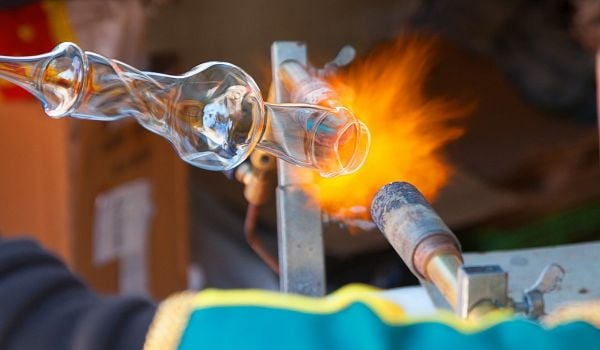The 1990s were tough on the textile industry, when scores of companies that called the Carolinas home — Erwin, North Carolina, heralds itself as The Denim Capital Of the World — went offshore, where wages were cheaper. But in the foothills of the Blue Ridge Mountains in Mount Airy, North Carolina, one family-owned manufacturer was just getting started.
Nester Hosiery opened in 1993, anted up to a barebones crew of 25 employees in 1996 and boasts over 200 employees today. They produce 150,000 pairs of socks a week for about 20 brands, including hiking favorites like Woolrich. But their newest endeavor, Farm to Feet, aims to do something that is both increasingly rare and increasingly popular: 100 percent Made In America. Take a look at racks across America today — the biggest shopping day of the year — and see the proud American-made tag gracing everything from vintage-style watches from Detroit’s Shinola brand to dark-rinse selvedge denim jeans from Raleigh Denim, located not far from Nester in Greensboro, North Carolina.
But often what’s missing from the Made in the U.S.A tag is the supply chain. A Detroit-made watch may be assembled out of Swiss components or a pair of North Carolina jeans could have a zipper made in Japan. With Farm to Feet — a play on the farm to table restaurant movement — the entirety of Nester Hosiery’s supply chain is American.
That means the wool comes from American sheep. The packaging and ink for the socks is American. Every yarn in that sock is American. And it’s manufactured on American soil. Which, when you get down to it is terribly complicated. It’s easier for manufacturers to source their yarns from all over the world. Instead, Nester must look within the 50 states. For the family-owned business, the hard work is worth it.
Mount Airy — for all you 1960s television buffs, Andy Griffith’s hometown believed to be the model for Mayberry — is a small town of 10,338, according to the 2010 Census. Founder Marty Nester was born and raised there.
As other textile manufacturers in the region went by the wayside, Nester’s operation grew. That’s not lost on their employees.
“It’s something that impacted this community tremendously. This was originally a textile community and over the past 10, 15 years all those jobs went away,” 32-year-old Travis Smith told me on the floor of the Nester factory. “It affected everyone directly and indirectly. If you didn’t lose a job or have a family member lose a job, a friend lost a job. It’s really remarkable that Nester has stayed here and grown.”
And they’ve grown inside the factory, too. Horacio Naranjo, a nine-year employee of Nester, got an associates degree at the nearby community college and had opportunities to go elsewhere but stayed close to home. He took a job at Nester at 21 and has moved up the ranks from the late shift on the factory floor to supervisor in charge of managing workflow and ordering supplies. For Kelly Nester, the company’s president and Marty Nester’s nephew, Naranjo’s story embodies the company’s core commitment to staying local.
“It proves that we can manufacture hosiery here in the states,” Smith said. “And a superior product, at that.” (It’s a lesson that notorious Chinese manufacturer Foxconn seems to have internalized, with a recent $40 million investment into research and development in Pennsylvania.)

Credit: Bill Bradley
The Farm to Feet line is a calculated risk for Nester. The company’s primary occupation has been manufacturing socks for other companies since its inception and it will be revenue generated through that line of work that will bankroll the new venture, at least initially. “Nester is a well-established business that’s been profitable for 14 straight years,” president Kelly Nester said. “It certainly provides the resources for us to invest in this brand.”
The 100 percent merino wool socks, which retail between $15 and $28, are targeted for outdoor enthusiasts, from fisherman to cyclists. Nester would not disclose any sales projections, but they remain confident that Farm to Feet will eventually generate a small revenue stream.

Bill Bradley is a writer and reporter living in Brooklyn. His work has appeared in Deadspin, GQ, and Vanity Fair, among others.









